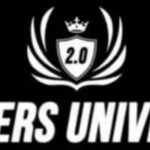Hustlers University 2.0 burst onto the scene as a controversial online learning platform, promising to empower individuals with the skills and knowledge to achieve financial success. This program, fueled by social media influencers and a captivating marketing campaign, quickly gained widespread attention. However, the program’s legitimacy and ethical practices were soon called into question, leading to a dramatic downfall and a lasting impact on the online learning landscape.
This article delves into the fascinating story of Hustlers University 2.0, examining its rise and fall, its unique business model, and its influence on the world of online education. We’ll explore the program’s controversial approach to learning, the ethical considerations surrounding its marketing practices, and the lessons learned from its tumultuous journey.
The Business Model and Offerings of Hustlers University 2.0
Hustlers University 2.0 (HU 2.0) is a digital learning platform that offers a membership-based subscription model designed to equip individuals with the knowledge and skills needed to build successful online businesses. The program leverages a curated collection of courses, resources, and community support to empower its members to achieve financial independence.
The Structure of the Program’s Membership and Subscription Model
HU 2.0 offers a single subscription tier, providing access to all its resources and content. The program’s subscription model is designed to be affordable and accessible to a wide range of individuals.
The Key Areas of Knowledge and Skills Offered Within the Program
HU 2.0 offers a comprehensive curriculum covering various aspects of online business creation and management. The program focuses on providing practical knowledge and actionable skills that can be immediately implemented.
- E-commerce: The program teaches members how to set up and operate successful online stores, including product sourcing, marketing, and customer service. It emphasizes utilizing platforms like Shopify, Amazon, and eBay to maximize sales and profitability.
- Affiliate Marketing: HU 2.0 provides comprehensive training on affiliate marketing, covering strategies for selecting profitable niches, promoting products effectively, and driving traffic to affiliate links. The program includes guidance on using various marketing channels, such as social media, email marketing, and content marketing.
- Social Media Marketing: The program emphasizes the importance of social media in today’s digital landscape, teaching members how to build a strong online presence, engage with their audience, and leverage social media platforms for business growth. The curriculum covers strategies for content creation, community building, and paid advertising on platforms like Instagram, TikTok, and Facebook.
- Copywriting: HU 2.0 emphasizes the power of compelling copywriting in driving sales and conversions. The program provides practical training on writing persuasive sales copy, crafting engaging website content, and creating effective marketing materials.
- Cryptocurrency and NFTs: Recognizing the growing importance of blockchain technology, HU 2.0 offers modules dedicated to cryptocurrency and NFTs. The program covers topics such as investing, trading, and creating and selling NFTs, providing members with insights into this emerging market.
- Community Support and Mentorship: HU 2.0 fosters a strong community among its members, providing opportunities for networking, collaboration, and mentorship. The program offers access to dedicated support channels, forums, and workshops where members can connect with peers and learn from experienced entrepreneurs.
Comparison with Other Online Learning Platforms
HU 2.0 differentiates itself from other online learning platforms by focusing on practical, actionable skills that can be immediately applied to building a successful online business. While other platforms may offer a broader range of courses, HU 2.0 provides a more specialized and focused curriculum designed to equip members with the tools and knowledge they need to succeed in specific online business niches.
Focus on Specific Niches and Industries, Hustlers university 2.0
HU 2.0 emphasizes the importance of choosing a niche and building expertise within a specific industry. The program provides guidance on identifying profitable niches, conducting market research, and developing specialized skills to stand out in a competitive market.
The Legacy of Hustlers University 2.0

Hustlers University 2.0, a controversial online program that promised to teach students how to make money online, left a lasting impact on the world of online education. Despite its eventual shutdown, the program’s rise and fall offer valuable lessons about the future of online learning and the role of social media in its development.
The Lasting Impact of Hustlers University 2.0’s Approach to Education
The program’s success, however brief, highlights the growing demand for accessible and affordable online education. However, its controversial methods, which often involved questionable business practices and claims of quick riches, also raised serious concerns about the ethics and quality of online learning. Hustlers University 2.0’s legacy is a complex one, serving as both a cautionary tale and a catalyst for change in the online education landscape.
Lessons Learned from Hustlers University 2.0’s Rise and Fall
The program’s rise and fall offer valuable lessons about the importance of ethical business practices and the need for transparency in online education. The program’s reliance on hype and promises of quick riches ultimately led to its downfall. Its lack of transparency and questionable business practices created a climate of distrust and ultimately contributed to its closure.
Long-Term Implications for Online Learning and Business Models
The rise and fall of Hustlers University 2.0 has had a significant impact on the online learning landscape. The program’s success demonstrated the potential of online education to reach a wider audience, but its failure highlighted the need for greater regulation and accountability in the online learning industry. The program’s emphasis on “get rich quick” schemes also exposed the dangers of promoting unrealistic expectations and potentially harmful business practices.
The Future of Online Education and the Role of Social Media
The future of online education is likely to be shaped by the lessons learned from Hustlers University 2.0. As online learning continues to grow in popularity, there is a growing need for ethical and transparent business practices. The role of social media in online education is also likely to evolve. While social media can be a powerful tool for connecting learners and educators, it also presents challenges related to misinformation and the spread of harmful content. The online learning industry must find ways to harness the power of social media while mitigating its potential risks.
The Future of Online Education and Community Building

The landscape of online learning is rapidly evolving, driven by technological advancements and shifting learner expectations. Traditional models of education are being challenged by the emergence of innovative platforms and approaches that prioritize accessibility, flexibility, and personalized learning experiences.
The Evolving Landscape of Online Learning
The rise of online learning has been fueled by several key factors, including the increasing demand for flexible and affordable education options, the proliferation of technology, and the growing recognition of the value of lifelong learning. The emergence of new platforms and technologies has created a more diverse and dynamic online learning environment.
- Microlearning platforms: Platforms like Coursera, edX, and Udemy offer a wide range of short, focused courses on various topics, catering to learners seeking to acquire specific skills or knowledge in a flexible manner. These platforms leverage microlearning principles, breaking down complex topics into smaller, easily digestible modules.
- Interactive learning experiences: Virtual reality (VR) and augmented reality (AR) technologies are transforming the online learning experience, offering immersive and engaging environments that enhance understanding and retention. These technologies can simulate real-world scenarios, providing learners with hands-on experience in fields like healthcare, engineering, and design.
- Personalized learning pathways: Adaptive learning platforms use artificial intelligence (AI) to personalize the learning experience for each individual. These platforms track student progress, identify areas of strength and weakness, and adjust the learning path accordingly. This personalized approach caters to diverse learning styles and paces, enabling learners to progress at their own speed.
The Role of Online Communities and Collaborative Learning
Online communities are playing an increasingly important role in fostering a sense of belonging and supporting collaborative learning. These communities connect learners with peers, mentors, and experts, providing a platform for knowledge sharing, peer-to-peer learning, and collaborative projects.
- Online forums and discussion boards: Platforms like Reddit, Quora, and Stack Overflow facilitate knowledge sharing and problem-solving through online discussions. These forums provide a space for learners to ask questions, seek advice, and engage in meaningful conversations with peers and experts.
- Collaborative learning projects: Online platforms are enabling collaborative learning projects that connect learners from diverse backgrounds and geographical locations. These projects foster teamwork, communication, and critical thinking skills, while providing learners with practical experience in applying their knowledge.
- Mentorship and peer support: Online communities provide opportunities for mentorship and peer support, connecting learners with experienced individuals who can offer guidance, feedback, and encouragement. These relationships can be invaluable in navigating the challenges of online learning and building confidence in one’s abilities.
Key Trends Shaping the Future of Online Education
The future of online education is characterized by several key trends that are shaping its accessibility, affordability, and impact.
- Increased accessibility: The rise of online learning has made education more accessible to individuals who may not have access to traditional educational institutions due to geographical location, financial constraints, or personal circumstances.
- Focus on skills and employability: Online learning platforms are increasingly focusing on developing skills that are in high demand in the job market. This shift reflects the growing importance of lifelong learning and the need for individuals to adapt to evolving industry needs.
- Integration of technology: The future of online education will see the integration of cutting-edge technologies like AI, VR, and AR to create more engaging, interactive, and personalized learning experiences.
The Future of Online Learning and Its Potential to Empower Individuals
The future of online learning holds immense potential to empower individuals and democratize access to knowledge. Online learning platforms can provide learners with the tools and resources they need to acquire new skills, advance their careers, and contribute to society.
- Lifelong learning: Online learning platforms can foster a culture of lifelong learning, enabling individuals to continuously acquire new skills and knowledge throughout their lives. This is crucial in an increasingly dynamic and complex world, where adaptability and continuous learning are essential for success.
- Empowering individuals: Online learning platforms can empower individuals by providing them with the knowledge and skills they need to pursue their passions, start their own businesses, and make a positive impact on their communities.
- Global collaboration: Online learning platforms can facilitate global collaboration, connecting learners from diverse backgrounds and cultures to share knowledge, ideas, and experiences. This fosters cross-cultural understanding and promotes innovation.
The Ethical Considerations of Online Education and Marketing
The rapid growth of online education presents unique ethical challenges that demand careful consideration. While online platforms offer accessibility and affordability, they also raise concerns about the quality of education, transparency of marketing practices, and the potential for exploitation. This section explores the ethical implications of promoting online courses and programs, identifies challenges in ensuring transparency and accountability, and examines the role of ethics in shaping the future of online learning.
The Ethical Implications of Promoting Online Courses and Programs
Promoting online courses and programs ethically involves ensuring that the marketing materials are truthful, accurate, and do not mislead potential students. This includes clearly outlining the course content, learning outcomes, instructors’ qualifications, and any associated costs. Ethical marketing practices also emphasize transparency about the program’s structure, delivery methods, and support services.
Challenges of Ensuring Transparency and Accountability in Online Education
Maintaining transparency and accountability in online education is crucial for building trust and credibility. Key challenges include:
- Verifying the Quality of Education: Ensuring that online courses meet established standards of quality can be difficult, as traditional measures like accreditation may not always apply.
- Guaranteeing Instructor Expertise: Verifying the qualifications and experience of online instructors can be challenging, especially in niche areas or emerging fields.
- Addressing Student Concerns: Online platforms need to provide clear and accessible mechanisms for students to raise concerns, report issues, and receive timely responses.
The Role of Ethical Considerations in Shaping the Future of Online Learning
Ethical considerations play a critical role in shaping the future of online learning. By prioritizing ethical practices, online education providers can foster a more trustworthy and sustainable environment. This includes:
- Promoting Ethical Marketing Practices: Encouraging adherence to ethical guidelines for online marketing ensures that students are not misled or exploited.
- Developing Robust Quality Assurance Mechanisms: Implementing rigorous quality assurance measures, such as peer review, independent assessments, and accreditation processes, helps ensure the quality of online courses.
- Fostering a Culture of Transparency and Accountability: Online platforms should encourage open communication, transparency in their operations, and clear mechanisms for addressing student concerns.
Best Practices for Ethical Online Education and Marketing
Adhering to best practices for ethical online education and marketing helps ensure that online learning opportunities are accessible, affordable, and of high quality. Key best practices include:
- Providing Accurate and Transparent Information: Clearly outlining the course content, learning outcomes, instructors’ qualifications, and any associated costs in marketing materials.
- Verifying Instructor Expertise: Ensuring that instructors have the necessary qualifications and experience to deliver the course content effectively.
- Offering Clear and Accessible Support: Providing students with easy access to technical support, academic advising, and other resources to help them succeed in their studies.
- Establishing a Robust Complaints Process: Implementing a clear and accessible process for students to raise concerns, report issues, and receive timely responses.
- Promoting Ethical Marketing Practices: Adhering to ethical guidelines for online marketing to ensure that students are not misled or exploited.
The saga of Hustlers University 2.0 serves as a cautionary tale and a valuable lesson for both online educators and students. It highlights the importance of critical thinking, due diligence, and ethical considerations in the realm of online learning. As the online education landscape continues to evolve, understanding the past and its implications is crucial for navigating the future and ensuring the responsible development of this transformative field.
Hustlers University 2.0 offers a range of courses and resources, but it’s important to remember that financial success often requires professional guidance. If you’re looking for a personalized approach to managing your finances, consider reaching out to a flat fee financial advisor near me. They can provide tailored strategies to help you achieve your financial goals, complementing the skills you learn through Hustlers University 2.0.
Hustlers University 2.0 is a popular online program that teaches people how to make money online. While it offers a variety of courses, one important aspect of financial success is proper financial planning. If you’re looking for guidance in this area, consider connecting with a fidelity financial advisor near me. A financial advisor can help you create a personalized plan that aligns with your goals and financial situation, complementing the skills you’re learning in Hustlers University 2.0.
Hustlers University 2.0 offers a variety of courses on business and entrepreneurship, but sometimes you need personalized advice to take your financial goals to the next level. If you’re looking for guidance, consider reaching out to a female financial advisor near me for tailored support. Their expertise can complement the skills you’re learning in Hustlers University and help you navigate your financial journey with confidence.







